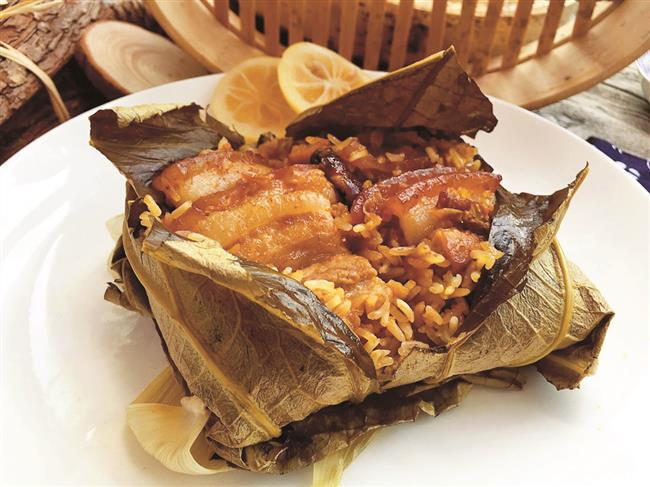A season to savor lotus-made delicacies
Hangzhou locals have long appreciated the lotus for its beauty, fragrance and yummy taste. Now, it is the harvest time for lotus seedpods! The raw seeds that are embedded in the round pods taste refreshing and aromatic, which make them popular with gastronomes.
West Lake is the best place in the city to see lotus flowers but its seedpods cannot always keep up with market demand. Whether you are visiting the city on a short trip or locals who have lived their entire lives in Hangzhou, the lotus pods produced from the lake rarely fail to disappoint.
Undulating in the summer breeze, pink and white lotuses have been cultivated in the lake for centuries. Local administrative departments dispatch workers to pluck seedpods on mornings. And they only sell between 7am and 8am.
Buying fresh-picked seedpods needs some good luck, because the selling spot is not fixed. Usually, workers randomly drop the seedpods at the bank of Broken Bridge, Moon over the Peaceful Lake in Autumn, back of the Solitary Hill, and Beishan Road. The fresh seedpods are available through late August and early September, except weekends. The big variety is priced at 2.5 yuan (37 US cents), while the small one is 2 yuan. Since the production is limited, every buyer can only purchase up to 10 yuan.
The lotus seeds are quite versatile. People grind the dried seeds into powder, which is one of the most common Hangzhou specialties among tourists. The sweet, sticky starch is considered a nourishing food in China. It is often mixed with hot water for a nice drink.
Meanwhile, the seed powder is one of the most common ingredients used in mooncakes. It is considered as a luxurious filling and often goes with salted egg yolk, which is a quite popular type during Mid-Autumn Festival.
In addition to seeds, the lotus leaves, flowers and roots are also common food ingredients in Hangzhou cuisine. This is the best season to savor lotus-made delicacy as the thriving lotus provides a large amount of fresh food materials. Shanghai Daily takes a look at several lotus dishes that are easy to find at restaurants.

Lotus seeds and white fungus soup
Lotus seeds and white fungus soup 银耳莲子汤
It is a traditional soup that is believed to nourish yin (cold) energy in nature, promote production of fluids, boost the blood circulation, improve the appetite and treat yin deficiency. And in traditional medicinal food therapy, white fungus has important anti-aging properties because it could clear internal heat, reduce blood pressure and replenish moisture, especially in the lungs.
The soup is popular with women as the combination of the two creates a great tonic in summer. Meanwhile, it is a common home soup because of its easy cooking process.
First, soak dried white fungus in water for several hours in order to make them inflate and soft. Second, put the fungus, lotus seeds and some red jujubes into a pot, adding water to just above the material. Stew them and then add crystal sugar.
The soup can be served hot, cold or iced. The final soup is thickened by gelatinous material found in white fungus. It tastes smooth with al dente white fungus and aromatic lotus seeds.
Where to eat:
? Xin Feng Xiao Chi Restaurant
Address: 209 Qingchun Rd
Tel: (0571) 8770-0810

Sliced lotus root simmered with pork ribs
Sliced lotus root simmered with pork ribs 莲藕排骨汤
Usually the pork spare ribs are secured from a young pig, which helps ensure a tender and a mild taste.
The lotus root helps remove grease and add some fragrant smell to the soup.
The lotus root juices mix well with the spare ribs, generating a refreshing and savory taste.
This is a classical Zhejiang dish and popular among Hangzhou natives, because cooks have invented many ways to highlight the tenderness of the meat while balancing the strong smell and taste. Chefs never use an iron pot to cook the soup because it contains flavonoid that can have chemical reaction with iron and lose the antioxidant. The pork ribs can be replaced with trotter. Sometimes sliced ginger is put into the soup to remove the odor of raw meat.
Where to eat:
? Green Tea Restaurant
Address: 98 Yan’an Rd S.
Tel: (0571) 8700-2788

Steamed pork rib and rice wrapped with lotus leaves
Steamed pork rib and rice wrapped with lotus leaves 荷叶糯米排骨
As a noteworthy dish over the country, the authentic version originated in Hangzhou and was believed to be made of the lotus leaves picked from the Breeze-ruffled Lotus at Quyuan Garden, which is one of the most popular tourist attractions in summer as it is ablaze with pink lotus flowers.
Dried lotus leaf is good for the spleen, liver, stomach and heart. It has curative effect on high blood pressure, hyperglycemia and hypercholesterolemia. It can also remove inner moisture and improve the mood.
First of all, soften the dried leaves in boiled water, and then marinate the pork with seasonings for 30 minutes. Third, mix the pork with glutinous rice and use the soft lotus leaves to wrap them together. Then steam for two hours.
The pork ribs and rice savors with refreshing taste from the lotus leaves. In Hangzhou, the dish is available from roadside food stalls to upscale restaurants.
Where to eat:
? Zhi Wei Guan Restaurant
Address: 83 Renhe Rd
Tel: (0571) 8701-8638















